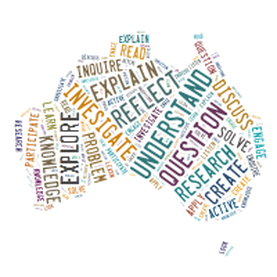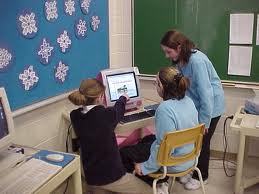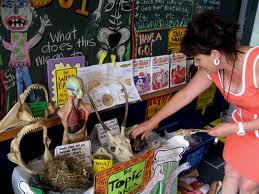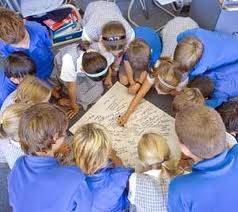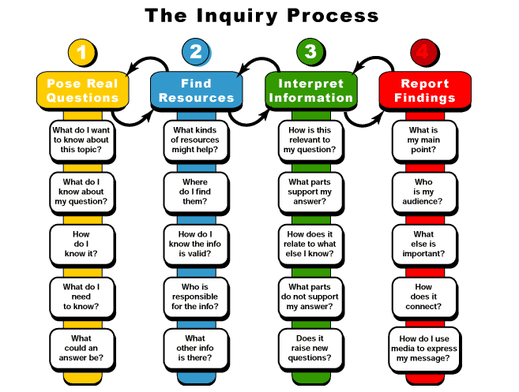What is Inquiry Pedagogy?
Pedagogy is defined as “any conscious activity by one person designed to enhance learning in another” (Watkins & Mortimer, 1999, p. 3). Inquiry pedagogy therefore, is based around a set of teaching and learning strategies that involve student-centred research and investigation that encourages metacognitive thought processes, discussion and collaboration. Carroll defines Inquiry Pedagogy as an understanding about society and its interactions that "requires us to seek out knowledge as well as apply historical skills to determine why events occurred and what motivated the people to take the action they took" (2012).
_
_
References:
Carroll, K. (2012). Pedagogy Revised. Retrieved from http://leo.acu.edu.au/course/view.php?id=6193
Watkins, C. and Mortimer, P. (1999). Pedagogy: what do we know? In P. Mortimer (Ed), Understanding Pedagogy and its Impact on Learning, (pp. 20-45). London: Paul Chapman Publishing Ltd.
Carroll, K. (2012). Pedagogy Revised. Retrieved from http://leo.acu.edu.au/course/view.php?id=6193
Watkins, C. and Mortimer, P. (1999). Pedagogy: what do we know? In P. Mortimer (Ed), Understanding Pedagogy and its Impact on Learning, (pp. 20-45). London: Paul Chapman Publishing Ltd.
What does Inquiry Learning look like?
Inquiry learning is based on constructivist theory, where learning is seen as a social process involving a mutual exploration of ideas through experiences and language (Cross, 1996). During Inquiry Learning the teacher becomes a co-learner, working together with students to investigate a topic and guiding students through their inquiry with the use of appropriate scaffolding. In the classroom Inquiry Learning means student-centred hands-on activities, which relate to real life situations and events. Inquiry Learning not only encourages students to actively construct their own knowledge and bring personal ideas and concepts to the learning experience, but encourages them to make changes in their attitudes and behaviours (Kuhlthau, Maniotes, & Caspari, 2007).
There are many Inquiry Learning Models available to educators, including one constructed by inquiry expert Kath Murdoch, who lists the following phases as integral to Inquiry Learning (For a full explanation of these phases click here. For more information on Kath Murdoch and Inquiry Learning click here.):
- Finding Out
- Sorting Out
- Going further
- Tuning into Students' Thinking
- Syntehsising and Reflecting
- Acting and Applying
Alternate inquiry models include TELSTAR, the Action Research Model and Integrating Socially. All three of these models are detailed in this document produced by the Queensland Curriculum Council. (Sourced from: www.qsa.qld.edu.au)
| inquiry_learning_models.doc | |
| File Size: | 186 kb |
| File Type: | doc |
A number of Inquiry Learning models and resources are also available to educators online, including the below model sourced from Education Jargon Wiki. To learn what the world is saying about Inquiry Learning visit the Storify I created.
References:
Cross, M. (1996). Teaching Primary Science: empowering children for their world. Melbourne: Longman Australia.
Kuhlthau, C., Maniotes, L., & Caspari, A. (2007). Guided Inquiry: Learning in the 21st Century. London: Libraries Unlimited.
_
Cross, M. (1996). Teaching Primary Science: empowering children for their world. Melbourne: Longman Australia.
Kuhlthau, C., Maniotes, L., & Caspari, A. (2007). Guided Inquiry: Learning in the 21st Century. London: Libraries Unlimited.
_
How can I implement Inquiry Learning in HSIE?
The NSW Board of Studies promotes the teaching of HSIE through inquiry based learning processes that require students to seek information, analyse sources, pose questions and discover answers. "In this rapidly changing society there has never been a greater need for students to have the skills to locate, access, manipulate, select and critically evaluate relevant sources of information" (Board of Studies, 2006, p. 11). Listed below are some inquiry based activities that can be used to teach HSIE in the classroom, some of which will be used in the sample teaching and learning overview and lesson plan provided on this site:
|
|
|
Reference: Marsh, C., & Hart, C. (2011). Teaching the Social Sciences and Humanities in an Australian Curriculum (6th ed). Malaysia: Pearson Education.
'"What we want to see is the child in pursuit of knowledge, and not knowledge in pursuit of the child."
George Bernard Shaw
George Bernard Shaw
